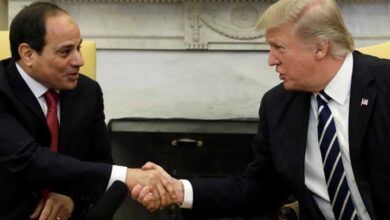
US-based Egyptian intellectual Khaled Abou El Fadl has highlighted claims about US pressure on Egypt's ruling military council over its recent political stances.
In a phone call with Al-Masry Al-Youm, Abou El Fadl, who is head of the Islamic philosophy department at Yale University and former head of the US Commission on International Religious Freedom, said the US backs the military council’s stance on the People’s Assembly dissolution, its issuance of the complementary Constitutional Declaration, and its refusal to recognize indications of the Muslim Brotherhood’s victory in the presidential election runoffs.
Abou El Fadl said there had been a division in US policy on Egypt over the past months, between “the US State Department’s point of view, which supports democracy in Egypt without backing specific candidate and awaiting the election results, even if it brings a Brotherhood candidate who offered guarantees not to harm the US interests in Egypt or the region, and the Pentagon’s point of view, supported by the Israel lobby in the US, which believes Washington’s interests will not be achieved without supporting former Prime Minister Ahmed Shafiq, to guarantee ongoing stability of US interests in Egypt and the region.”
“The White House was leaning toward the State Department’s point of view, but was forced to respond to Zionist pressures on the US decision, especially as the US presidential elections are approaching,” he added, saying that the US has adopted the Pentagon’s point of view.
Abou El Fadl said the military council in Egypt and the Saudi government also helped convince the White House of the Pentagon’s point of view — that the Egyptian revolution has ended and that Egyptians have become bored with state of instability, which had lasted since the revolt of January 2011. Thus, the White House called on the military council to support Shafiq in all legitimate ways.
However, “the surprise was the victory of Morsy over Shafiq at most of the polling stations that US delegations followed the process at,” he said.
He added that he recently attended several discussions in Washington, all of which stressed the necessity of supporting the military council in its recent decisions, using an official discourse that shows anger about what’s happening in Egypt, but supporting all the council’s decisions and granting economic aid to Egypt during the coming months if Shafiq wins.
“Enhancing the Israeli military forces on common borders with Egypt was also part of the Zionist pressures on the US. It aimed at delivering a message to the US that Israel will not stay with its hands tied if its borders are threatened. It will protect its borders and prevent any support to Hamas if the Brotherhood candidate assumed power,” Abou El Fadl said.
Edited translation from Al-Masry Al-Youm




